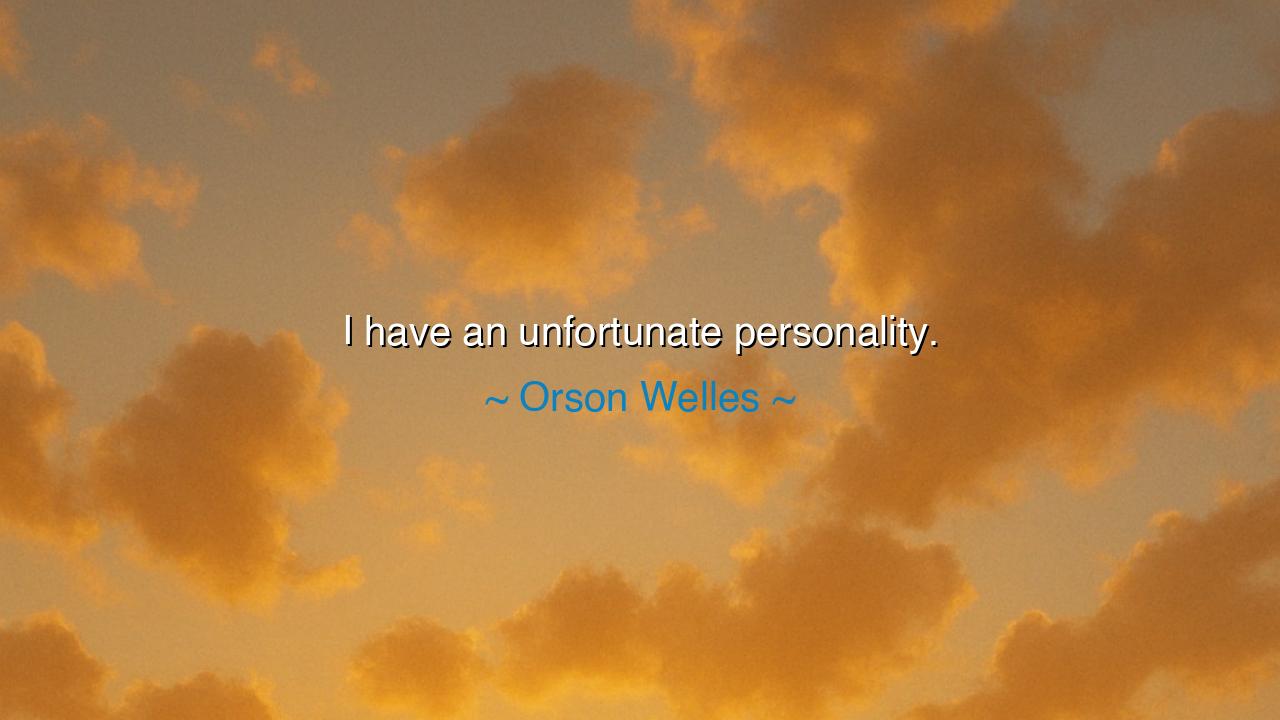
I have an unfortunate personality.






"I have an unfortunate personality." These words, uttered by the great Orson Welles, are steeped in a profound truth that transcends time. Welles, a man whose artistic genius was both celebrated and controversial, recognized the complexity of his own nature, acknowledging the tension between his public persona and the more intimate, often misunderstood, parts of his being. With this self-deprecating statement, he points to a universal theme that has resonated throughout human history: the conflict between self-perception and how others perceive us, the constant struggle to reconcile the person we are with the person we are expected to be.
In the ancient world, the Greeks often pondered the nature of the self. Socrates, whose teachings laid the foundation for much of Western philosophy, famously said, "Know thyself." His words were not mere advice but a call to deep introspection—to face not just the noble parts of oneself, but also the darker, more difficult aspects. The philosopher Aristotle, in his works, spoke of the virtue of self-awareness, understanding that true wisdom comes from accepting the whole of one’s nature, flaws and all. Welles’ remark resonates with this ancient wisdom: the unfortunate personality is not a flaw to hide, but a part of the self that must be acknowledged and understood.
The lives of artists like Welles often serve as a mirror to the struggles faced by many of us. Just as Van Gogh wrestled with his inner demons, creating masterpieces that were only appreciated long after his death, Welles too faced the dichotomy between his extraordinary talent and the internal battles that shaped his character. His personality, as he described it, was perhaps a reflection of the passion and intensity that drove his art—forces that, while propelling him to greatness, may have also alienated him from those around him. Yet in recognizing his own perceived flaws, Welles reminds us that even the greatest among us are not immune to the burden of personal imperfection.
In more recent times, the story of Winston Churchill, a man whose stubbornness and forthright personality earned him both admiration and scorn, parallels Welles’ words. Churchill was known for his indomitable spirit and his ability to lead Britain through its darkest hours, yet his character—his sharp tongue, his occasionally abrasive manner—was often seen as unfortunate by many. Yet, in the fullness of his leadership, Churchill’s personality became a defining part of his greatness. His perceived flaws, the very traits that others may have deemed unfortunate, were essential to his strength and vision. His story shows us that what we often perceive as unfortunate may, in fact, be integral to the fulfillment of our destiny.
Welles’ statement, though spoken with a sense of humor, is deeply reflective of the human condition—the need to reconcile our internal selves with external expectations. Brené Brown, in her work on vulnerability, suggests that accepting our imperfections is the key to authentic connection. In a world that often values perfection and polished personas, the willingness to embrace the unfortunate parts of our personalities can serve as a powerful source of strength. Welles’ unfortunate personality is not an obstacle but a tool—a part of the authentic self that makes his work, and his life, deeply human.
The lesson here is one of acceptance and self-awareness. Just as Socrates urged us to know ourselves fully, Welles reminds us that even our flaws, when viewed through the lens of understanding, can become sources of strength. There is power in embracing our true selves, in accepting that our personalities, however unfortunate they may seem, are not barriers to our potential but rather the wellspring of our authenticity. Self-acceptance leads to a deeper understanding of others and, in turn, a deeper connection to the world.
In practical terms, the actions we can take are simple, yet profound: we must begin by embracing all aspects of who we are, even those parts of ourselves that we perceive as flawed. Rather than hiding our imperfections, we must celebrate them, for they are integral to our unique journey. Just as Orson Welles did not shy away from the complexities of his personality, so too must we approach life with courage, recognizing that it is in our imperfections that we find the rawness and honesty that make us truly human. Let us honor our own “unfortunate personalities” as the very thing that connects us to others and to the deepest parts of ourselves.






AAdministratorAdministrator
Welcome, honored guests. Please leave a comment, we will respond soon